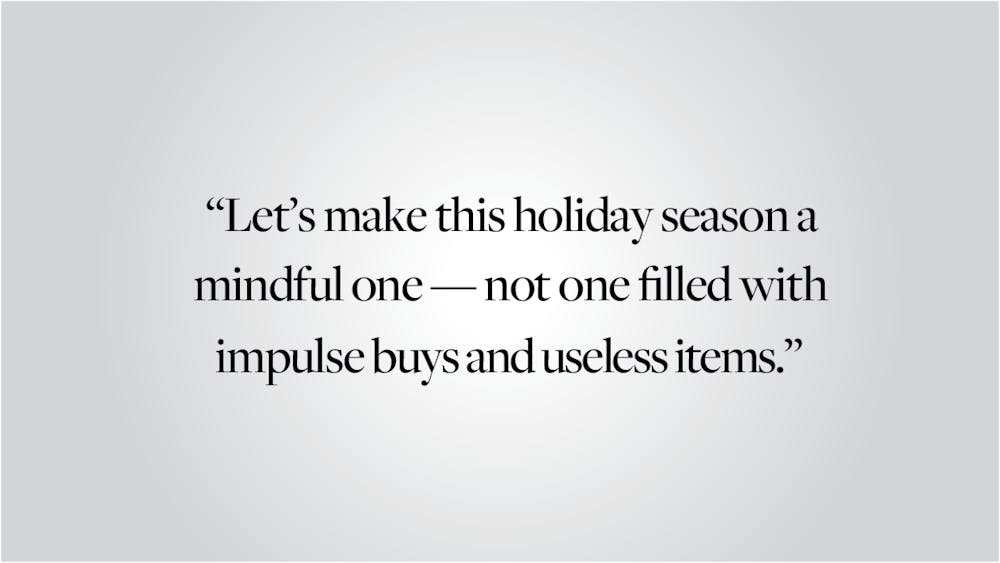With Thanksgiving this week and the holiday season rapidly approaching, my email inbox and social media feeds have been flooded with one thing: Black Friday promotions. The biggest shopping event of the year comes with hefty discounts, crowded stores and late-night Amazon impulse buys. At the same time, the flashy sales are responsible for hundreds of thousands of tons of greenhouse gas emissions, mountains of packaging waste and heaps of stress on retail workers. The unrestrained frenzy that defines the holiday shopping season is unsustainable. Black Friday and holiday shopping sales push consumerism to the extremes, promoting a culture of overconsumption that harms both people and the planet.
In the past several years, Black Friday has largely shifted online as businesses and consumers adapted to COVID-19 guidelines. But this form of spending has come at a cost. WasteManaged, a trash collection agency based in the United Kingdom, estimates that this year’s Black Friday will produce 429,000 metric tons of greenhouse gas emissions, the equivalent of 435 round-trip flights between London and New York. The group also reports that only 29% of Black Friday electronic waste is recycled, meaning that piles of computers, LED bulbs and monitors will sit in landfills after being thrown out in favor of newer electronics. Electronic waste is especially harmful as it can release compounds such as lead, mercury and arsenic into the environment, which can cause physical and cognitive damage to people and animals.
Black Friday’s screaming deals and constant reminders to spend money also encourage mindless consumerism by telling us that we need to buy more unnecessary, cheap goods. These purchases can be self-gratifying at first, but the discounted products seldom live up to expectations. “You’re going to buy things on sale because they’re on sale and you’ll see that you didn’t like them,” said Robert Schindler, a professor of marketing at Rutgers University and longtime researcher of consumer trends. “The deals distorted your decision process.” Often, these unwanted products are subsequently tossed out or returned, further contributing to a system of waste that is unsustainable in the long term. Retail therapy, Schindler argues, doesn’t really work.
Black Friday’s sales also carry a social impact. Large hordes of shoppers competing for goods and a surge of consumer demand can become major sources of stress and anxiety for retail workers, who must work extra long hours to package and ship products during the shopping holiday. In the past, Amazon workers in the United States and Europe have staged protests and gone on strike against exploitative working conditions and poor treatment of staff on Black Friday. Worse, workers often do not receive extra compensation for their efforts on the holiday.
Still, for some, Black Friday is one of the only opportunities to buy essential items at a fair price. A single parent, for example, may take advantage of a sale to buy their child a computer for school. Not everyone can afford the steep prices of electronics and house furniture without a markdown. Thus, criticizing Black Friday shoppers altogether isn’t helpful or productive. A better solution lies in practicing self-reflection about our roles as consumers and being mindful of what we actually need. For example, Paco de Leon, a financial planner, creates a list of things she plans to buy and frequently revisits it to remove items and add others. If something is on her list for an extended period, she knows it is something she should consider buying. Other approaches to mitigate the socio-environmental costs of Black Friday include supporting local businesses and participating in “Giving Tuesday,” a global movement to promote charitable acts of giving. Those who can afford to dedicate time and money to giving are often happier and more fulfilled when helping others than when spending for themselves.
In addition, businesses should be held accountable for the consumerist and environmentally damaging behaviors they may promote. Fortunately, many brands have rallied against traditional Black Friday trends in recent years by promoting sustainable initiatives. REI, the American outdoor recreation retailer, has closed its doors during Black Friday since 2015. It instead encourages employees and customers to #OptOutside and spend the shopping holiday enjoying the outdoors. In 2020, the shoe company Allbirds raised the prices of its sustainable shoes by $1 on Black Friday and donated the money earned to organizations fighting climate change. Similar moves by other larger companies could draw additional awareness to the damaging social and environmental impact of Black Friday and help counteract its consumerist culture.
Buy what you need and what makes you happy, but don’t forget about the far-reaching impact of our consumer decisions. Let’s make this holiday season a mindful one — not one filled with things we don’t need.
Juliet Fang ’26 can be reached at juliet_fang@brown.edu. Please send responses to this opinion to letters@browndailyherald.com and other op-eds to opinions@browndailyherald.com.
Juliet Fang is a second year at Brown studying Ecology and Evolutionary Biology. In her free time, she enjoys running, cycling, and watching duck videos.





